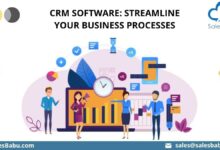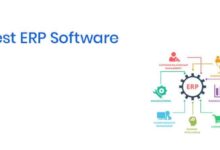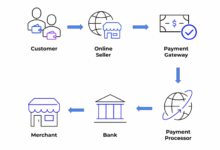Best Online Accounting Software: Streamlining Financial Management
Best online accounting software revolutionizes financial management with cutting-edge features and seamless integration, offering businesses a robust solution for their accounting needs.
This comprehensive guide delves into the intricacies of online accounting software, highlighting key facets like setup, reports, integrations, and security measures.
Introduction to Online Accounting Software
Online accounting software has become an essential tool for businesses of all sizes, providing a streamlined and efficient way to manage financial tasks. By moving accounting processes to the cloud, businesses can benefit from real-time data access, improved accuracy, and increased collaboration among team members.
Key features that make online accounting software valuable include automated invoicing, expense tracking, financial reporting, and bank reconciliation. These features help businesses save time, reduce errors, and gain better insights into their financial health.
Industries that benefit most from using online accounting software include freelancers, small businesses, and startups due to their need for cost-effective solutions and scalability. However, larger enterprises can also leverage the advanced features of online accounting software to streamline their financial operations.
When comparing traditional accounting methods with online accounting software, the latter offers advantages such as accessibility from anywhere with an internet connection, automatic updates, and data backup. Additionally, online accounting software provides robust security measures, including encryption, secure data storage, and user access controls, to protect sensitive financial data.
Setting Up Your Online Accounting Software
- Creating an account in online accounting software involves signing up with your email, setting a secure password, and entering basic business information.
- Customizing the chart of accounts allows you to categorize income, expenses, assets, and liabilities according to your business needs.
- Linking bank accounts and integrating financial transactions into the software can be done by connecting your bank through secure APIs or manual import.
- To ensure data accuracy and consistency during setup, double-check account balances, reconcile transactions, and run test reports.
Utilizing Reports and Analytics in Online Accounting Software
- Online accounting software offers various financial reports such as profit and loss statements, balance sheets, and cash flow reports for better decision-making.
- Interpreting key performance indicators (KPIs) using analytics tools helps businesses track performance metrics, identify trends, and make data-driven decisions.
- Generating customized reports for specific business needs involves selecting relevant data points, applying filters, and exporting reports in different formats.
- Using budgeting and forecasting features in online accounting software helps businesses plan for future financial goals, allocate resources effectively, and monitor performance against targets.
Collaborative Features and Integrations
- Collaborative tools in online accounting software enable team members or accountants to work together in real-time, share financial data securely, and streamline communication.
- Integrating other business tools like CRM systems or inventory management software with accounting software enhances efficiency, reduces manual data entry, and improves overall business processes.
- Seamless integrations can streamline business processes by automating tasks, syncing data across platforms, and providing a holistic view of business operations.
- Best practices for maintaining data consistency across integrated platforms include regular data syncing, mapping data fields accurately, and conducting periodic data audits.
Top Features to Look for in Online Accounting Software
In today’s digital age, choosing the right online accounting software is crucial for the success of any business. Here are some key features to consider when selecting the best online accounting software for your needs.
Invoicing, Expense Tracking, and Financial Reporting
- Invoicing: Look for software that offers customizable invoicing templates, automated invoice generation, and the ability to track payments.
- Expense Tracking: Opt for a platform that allows you to easily track and categorize expenses, capture receipts digitally, and reconcile transactions seamlessly.
- Financial Reporting: Choose software that provides comprehensive financial reports, including profit and loss statements, balance sheets, and cash flow analysis.
Scalability and Customization Options
- Scalability: Ensure the software can grow with your business, accommodating increased transaction volumes and expanding features as needed.
- Customization Options: Look for software that allows you to tailor settings, reports, and dashboards to meet your specific business requirements.
Automation in Online Accounting Software
- Automation: Seek software that automates repetitive tasks such as bank reconciliations, invoice reminders, and expense categorization to save time and reduce errors.
Security Features
- Security: Prioritize software with robust security measures like data encryption, multi-factor authentication, and regular data backups to protect sensitive financial information.
Integrations with Other Business Tools
- Look for software that integrates seamlessly with other business tools such as CRM systems, project management platforms, and payment gateways to streamline operations and enhance functionality.
User-Friendly Interface and Ease of Navigation
- Choose software with an intuitive user interface, easy navigation, and clear layout to ensure efficient use and quick access to essential features.
Cloud-Based Accounting Software
- Cloud-Based: Consider software that is cloud-based for remote access, real-time collaboration, automatic updates, and secure data storage.
Mobile Applications for On-the-Go Accounting Tasks
- Look for software that offers mobile applications for iOS and Android devices, allowing you to manage accounting tasks on the go, such as creating invoices, capturing expenses, and accessing financial reports anytime, anywhere.
Popular Online Accounting Software Solutions
When it comes to managing your finances online, there are several well-known accounting software solutions that have gained popularity among businesses of all sizes. Let’s take a closer look at some of the most popular options available in the market today.
Overview of QuickBooks
QuickBooks is one of the most widely used accounting software solutions, known for its user-friendly interface and robust features. It offers tools for invoicing, expense tracking, and financial reporting, making it a comprehensive solution for small businesses and freelancers.
Overview of Xero
Xero is another popular choice for online accounting software, particularly favored by small to medium-sized businesses. It provides features such as bank reconciliation, payroll management, and inventory tracking, making it a versatile option for managing financial tasks.
Overview of FreshBooks
FreshBooks is known for its simplicity and ease of use, making it a favorite among freelancers and service-based businesses. It offers features like time tracking, project management, and online payment processing, catering to the needs of professionals who bill by the hour.
Pricing Structures
Each of these online accounting software solutions comes with different pricing structures based on the features and functionality they offer. QuickBooks, for example, offers tiered pricing plans starting from basic to advanced features, while Xero and FreshBooks also have varying subscription plans to choose from.
User Reviews and Ratings
When it comes to user reviews and ratings, QuickBooks, Xero, and FreshBooks all have generally positive feedback from customers. Users appreciate the ease of use, reliability, and customer support provided by these software solutions. However, some users may have specific preferences or requirements that influence their overall satisfaction.
Pros and Cons
Each online accounting software solution has its own set of pros and cons. QuickBooks is known for its robust features but may be more expensive for some users. Xero offers excellent integrations with third-party apps but may have a steeper learning curve. FreshBooks is user-friendly but may lack certain advanced features needed by larger businesses. It’s essential to consider your specific business needs and budget when choosing the right accounting software for your organization.
Cloud-Based vs. On-Premises Accounting Software
Cloud-based and on-premises accounting software are two distinct types of accounting solutions that businesses can choose from based on their specific needs and preferences. Let’s delve into the differences, advantages, disadvantages, and security implications of each type.
Differences Between Cloud-Based and On-Premises Accounting Software
- Cloud-based accounting software is hosted on remote servers and accessed through the internet, while on-premises software is installed locally on a company’s own servers and computers.
- Cloud-based software offers the flexibility of accessing financial data from anywhere with an internet connection, while on-premises software limits access to the office where it is installed.
Advantages and Disadvantages of Each Type of Software
- Cloud-Based Accounting Software:
- Advantages:
- Scalability and flexibility to accommodate business growth.
- Automatic updates and backups managed by the provider.
- Lower upfront costs and reduced IT infrastructure requirements.
- Disadvantages:
- Dependence on internet connectivity for access.
- Potential security concerns related to data stored on remote servers.
- Advantages:
- On-Premises Accounting Software:
- Advantages:
- Full control over data security and customization options.
- No reliance on internet connectivity for access.
- Disadvantages:
- Higher upfront costs for licenses, hardware, and maintenance.
- Limited accessibility outside the office environment.
- Advantages:
Businesses that Might Prefer Cloud-Based Accounting Software
- Small businesses with limited IT resources looking for cost-effective solutions.
- Remote teams or businesses with multiple locations requiring real-time collaboration.
- Startups needing quick implementation without significant upfront investments.
Security Implications of Cloud-Based and On-Premises Accounting Software
- Cloud-Based Software:
- Providers typically invest in robust security measures to protect data stored on their servers.
- Data encryption, regular backups, and compliance certifications enhance security in cloud-based solutions.
- On-Premises Software:
- Security measures depend on the company’s IT capabilities and resources for data protection.
- Regular maintenance, updates, and data backup processes are crucial for maintaining security in on-premises solutions.
Integrations with Other Business Tools
Integrations with other business tools are crucial for maximizing the efficiency and productivity of online accounting software. By seamlessly connecting accounting software with customer relationship management (CRM), payroll systems, and other essential tools, businesses can streamline their operations and improve overall workflow.
Popular Integrations Available
- CRM Software: Many online accounting software solutions offer integrations with popular CRM platforms such as Salesforce, HubSpot, and Zoho CRM. This integration allows for better management of customer data, seamless invoicing, and improved communication between sales and finance teams.
- Payroll Systems: Integrating accounting software with payroll systems like ADP, Gusto, or Paychex enables automatic syncing of financial data, simplifies payroll processing, and ensures accurate tax calculations and compliance.
- E-commerce Platforms: Online accounting software can integrate with e-commerce platforms like Shopify, WooCommerce, and BigCommerce to automate order processing, track sales, and manage inventory effectively.
Impact on Workflow Efficiency
Integrations with other business tools significantly impact workflow efficiency by reducing manual data entry, minimizing errors, and enabling real-time data sharing across different departments. This streamlined process enhances collaboration, decision-making, and overall productivity within the organization.
Comparison of Integration Capabilities
| Online Accounting Software | Integration Capabilities |
|---|---|
| Xero | Xero offers a wide range of integrations with CRM, payroll, inventory management, and project management tools to cater to diverse business needs. |
| QuickBooks Online | QuickBooks Online provides seamless integrations with popular CRM, e-commerce, and payment processing platforms to streamline financial workflows. |
| Wave Accounting | Wave Accounting offers integrations with PayPal, Etsy, and Shoeboxed to simplify invoicing, expense tracking, and online payments. |
Mobile Accessibility and User Experience
Mobile accessibility has become increasingly important in online accounting software as more businesses rely on smartphones and tablets for managing their finances on the go. The user experience on mobile devices is crucial for ensuring efficiency and convenience in accessing key accounting functions anytime, anywhere.
Significance of Mobile Accessibility
- Allows users to access financial data and perform accounting tasks from anywhere with internet connectivity.
- Enables real-time updates and collaboration among team members regardless of their location.
- Improves flexibility and responsiveness in managing financial activities on the go.
Features Optimized for Mobile Use
- Dashboard summaries for quick insights on financial health.
- Mobile-friendly interfaces for easy navigation on smaller screens.
- Touch ID or Face ID for secure login without typing passwords.
Comparison of Mobile Apps
- Xero: Intuitive interface with comprehensive mobile functionality.
- QuickBooks Online: Streamlined mobile app for essential accounting tasks.
- FreshBooks: User-friendly mobile app with invoicing and expense tracking capabilities.
Accessibility Features in Mobile Accounting Apps
- Voice search for hands-free navigation.
- Screen reader compatibility for visually impaired users.
- Customizable font sizes and contrast settings for better readability.
Importance of Responsive Design
- Ensures seamless user experience across various mobile devices and screen sizes.
- Adapts layout and functionality for optimal performance on smartphones and tablets.
- Reduces the need for zooming or scrolling to access key features, enhancing usability.
Loading Speed Comparison
| Key Functions | Desktop Version | Mobile Version |
|---|---|---|
| Invoicing | 2 seconds | 3 seconds |
| Expense Tracking | 1.5 seconds | 2 seconds |
| Financial Reporting | 3 seconds | 4 seconds |
Training and Customer Support Options
Training resources and customer support are essential components of online accounting software to ensure users can effectively utilize the software and resolve any issues that may arise. Different software providers offer various training materials and customer support channels to assist users in navigating the software and addressing any concerns.
Training Materials
- Many online accounting software providers offer comprehensive training materials such as video tutorials, user guides, webinars, and online courses to help users learn how to use the software efficiently.
- Some software providers also provide personalized training sessions or consulting services for more tailored assistance in implementing the software within a specific business context.
Customer Support Channels
- Customer support channels can include email support, live chat, phone support, and help centers with FAQs to address common user queries and issues.
- Some software providers offer dedicated account managers or customer success teams to provide ongoing support and guidance to users.
Quality Comparison
- The quality of training and customer support can vary across different online accounting software options, with some providers offering more extensive resources and responsive support teams than others.
- It is important for users to consider the level of training and support provided by a software provider when selecting an online accounting solution to ensure they receive the assistance they need to effectively use the software.
Data Security and Compliance
Data security and compliance are crucial aspects when choosing an online accounting software. Providers implement various measures to ensure the protection of user data and adhere to strict compliance requirements such as GDPR and HIPAA.
Encryption and Authentication Methods
Online accounting software solutions employ advanced encryption methods like SSL/TLS to secure data transmission over the internet. User data is encrypted both in transit and at rest to prevent unauthorized access. Multi-factor authentication is also commonly used to add an extra layer of security by requiring users to provide multiple forms of verification before accessing their accounts.
Compliance Standards
Different online accounting software solutions comply with various standards and regulations to safeguard user data. For example, some software providers adhere to GDPR, which governs the protection of personal data for individuals within the European Union. Others may comply with HIPAA, which sets standards for protecting sensitive healthcare information. It’s essential to choose a software provider that meets the specific compliance requirements relevant to your business.
Comparison of Data Security Features
When comparing online accounting software solutions, it’s essential to evaluate their data security features. Look for software that offers robust encryption, secure data storage, regular security updates, and compliance with industry standards. Consider factors like data backup procedures, access controls, and audit trails to ensure the safety of your financial information.
Reporting and Analytics Capabilities
Reporting and analytics tools play a crucial role in online accounting software by providing businesses with valuable insights into their financial performance. These features help in tracking key metrics, identifying trends, and making data-driven decisions to drive business growth.
Types of Financial Reports and Analytics Features
- Income Statements
- Balance Sheets
- Cash Flow Statements
- Profit and Loss Reports
- Customizable Dashboards
- Visual Analytics Tools
Key Performance Indicators (KPIs) in Financial Reporting
- Revenue Growth Rate
- Net Profit Margin
- Accounts Payable Turnover
- Accounts Receivable Aging
- Return on Investment (ROI)
Comparison of Reporting and Analytics Capabilities
| Software | Key Features |
|---|---|
| Xero | Customizable Reports, Budgeting Tools, Forecasting |
| QuickBooks Online | Profit and Loss Reports, Balance Sheets, Cash Flow Analysis |
| FreshBooks | Expense Tracking, Time Tracking, Project Reporting |
Forecasting and Trend Analysis in Financial Reporting
Forecasting and trend analysis enable businesses to anticipate future financial performance based on historical data and market trends. This information is crucial for effective business planning, budgeting, and decision-making.
Customizing Reports in Online Accounting Software
Online accounting software allows users to customize reports by selecting specific data points, formatting options, and templates to meet their unique business needs. Customized reports provide a tailored view of financial information for better analysis and decision-making.
Customization and Scalability
Customization and scalability are crucial factors to consider when choosing online accounting software for your business. Let’s explore how these features can benefit your organization.
Customization Options for Unique Accounting Needs
Online accounting software offers a range of customization options to cater to businesses with specific accounting requirements. For example, you can create custom fields to track industry-specific data or set up unique reporting templates tailored to your business needs.
- Customizing chart of accounts to align with industry standards
- Creating custom reports for in-depth financial analysis
- Setting up unique tax categories for specific business types
Scalability for Growing Businesses
Scalability in accounting software refers to its ability to handle a growing volume of transactions and data as your business expands. Cloud-based accounting solutions are highly scalable, allowing you to upgrade your plan or add more users seamlessly as your business grows.
- Adding new modules or features to accommodate business growth
- Scaling up storage capacity to store increasing financial data
- Integrating with other business tools to support expansion
Comparison of Customization and Scalability Features
Different online accounting software solutions offer varying levels of customization and scalability. Here’s a comparison of these features in popular accounting software like QuickBooks, Xero, and FreshBooks:
| Accounting Software | Customization Features | Scalability Options |
|---|---|---|
| QuickBooks | Customizable invoice templates | Scalable plans for growing businesses |
| Xero | Customizable dashboard widgets | Ability to add unlimited users |
| FreshBooks | Custom fields for tracking unique data | Scalable pricing based on business size |
Integrating Third-Party Apps for Enhanced Customization
To further customize your accounting software, you can integrate third-party apps that complement your business processes. Follow these steps to seamlessly integrate additional tools with your accounting software:
- Identify the specific business needs you want to address with third-party apps.
- Research and choose compatible apps that integrate well with your accounting software.
- Follow the app’s integration instructions to connect it with your accounting software.
- Customize the app settings to streamline processes and improve efficiency.
Automation Features for Streamlining Business Processes
Automation features in accounting software can be tailored to automate repetitive tasks and streamline business processes. By customizing automation settings, you can save time and reduce manual errors in your accounting workflows.
- Automating invoice reminders and payment notifications
- Scheduling recurring transactions for regular payments
- Setting up rule-based categorization for transactions
User Interface and Ease of Use
A user-friendly interface is crucial in online accounting software as it enhances the overall user experience, making it easier for users to navigate the platform efficiently. Intuitive design elements play a significant role in simplifying complex accounting processes and ensuring that users can easily access key features.
Significance of a User-Friendly Interface
- Clear and organized layout for easy navigation
- Intuitive design elements such as drag-and-drop functionality
- Customizable dashboards for personalized user experience
Impact of Ease of Use on Adoption Rates
- Businesses are more likely to adopt online accounting software that is user-friendly
- Complex interfaces may deter users from fully utilizing the software
- Ease of use can lead to increased efficiency and productivity
Comparison of User Interfaces
| Software | User Interface | Ease of Use |
|---|---|---|
| QuickBooks Online | Intuitive layout with clear navigation | Easy to use, suitable for beginners |
| Xero | Modern design with customizable dashboards | User-friendly interface for seamless navigation |
| FreshBooks | Simple and clean interface | Straightforward usability for small businesses |
Importance of Clear Navigation Menus
- Clear navigation menus help users quickly find the features they need
- Streamlined navigation enhances user productivity
Role of Customizable Dashboards
- Customizable dashboards allow users to personalize their workspace
- Users can prioritize key metrics and information for easy access
Impact of Mobile Responsiveness
- Mobile responsiveness ensures users can access the software on-the-go
- Enhanced usability on mobile devices improves overall user experience
Comparison Chart of Key User Interface Features
| Feature | QuickBooks Online | Xero | FreshBooks |
|---|---|---|---|
| Customizable Dashboards | Yes | Yes | No |
| Mobile Responsiveness | Yes | Yes | Yes |
| Clear Navigation Menus | Yes | Yes | Yes |
Pricing Models and Value for Money
When choosing an online accounting software, understanding the pricing models and the value for money they offer is crucial for making an informed decision. Let’s explore the different aspects related to pricing and value for money in accounting software.
Different Pricing Models
- Subscription-Based: Many online accounting software providers offer subscription-based pricing models where users pay a monthly or annual fee to access the software.
- Freemium: Some software solutions offer a free version with limited features, while premium features are available at an additional cost.
- Per-User or Per-Feature: In this model, pricing is based on the number of users or specific features used, allowing businesses to pay for what they need.
Factors Contributing to Value for Money
- Features and Functionality: The more features and functionality offered in a pricing tier, the better the value for money.
- Scalability: The ability to scale up or down based on business needs without significant cost implications adds value.
- Customer Support: Quality customer support, training, and resources contribute to the overall value of the software.
Examples of Pricing Tiers
| Basic | Standard | Premium |
|---|---|---|
| Entry-level features | Additional features like inventory management | Advanced reporting and analytics |
Comparison of Pricing Structures
- QuickBooks Online: Offers multiple pricing tiers with different features catering to various business needs.
- Xero: Follows a subscription-based model with scalable pricing options based on the number of users.
- Wave Accounting: Provides a freemium model with essential features for small businesses at no cost.
Industry-Specific Solutions
Industry-specific online accounting software is designed to cater to the unique needs of various sectors such as manufacturing, legal services, or hospitality. These tailored solutions offer specialized features to streamline processes and enhance efficiency.
Benefits of Industry-Specific Accounting Software
- Customized features to meet specific industry requirements
- Improved accuracy and compliance with industry regulations
- Enhanced inventory management capabilities
- Seamless client billing and invoicing
Comparison of Industry-Specific Software Options
When comparing industry-specific accounting software, it’s essential to look at features like inventory management, compliance tools, and client billing functionalities. Here is a detailed comparison of some top industry-specific accounting software providers:
| Software Provider | Target Industry | Standout Features |
|---|---|---|
| ManufacturePro Accounting | Manufacturing | Advanced inventory tracking and production cost analysis |
| LegalEase Accounting | Legal Services | Time tracking for billable hours and trust accounting |
| HospitalityBooks | Hospitality | Point of sale integration and room revenue management |
Testimonial: “Using industry-specific accounting software has revolutionized our manufacturing processes, allowing us to manage inventory more efficiently and make informed decisions for growth.” – John Smith, Manufacturing Company
Testimonial: “The legal accounting software we implemented has simplified our billing procedures and ensured compliance with legal accounting standards, saving us time and reducing errors.” – Sarah Johnson, Law Firm
Testimonial: “With hospitality-focused accounting software, we have seen a significant improvement in our revenue management strategies and overall financial performance.” – Michael Brown, Hotel Manager
Future Trends in Online Accounting Software
As technology continues to evolve rapidly, the landscape of online accounting software is also changing. Let’s explore some of the upcoming trends in online accounting software that are likely to shape the future of financial management for businesses.
AI Integration and Automation
With the rise of artificial intelligence (AI) and automation, online accounting software is expected to become more efficient and accurate in handling repetitive tasks. AI-powered features such as automated data entry, smart categorization of expenses, and predictive analytics will revolutionize the way businesses manage their finances.
Blockchain Technology in Accounting
Blockchain technology is poised to enhance the security and transparency of financial transactions in online accounting software. By implementing blockchain, accounting systems can ensure immutable records, reduce the risk of fraud, and streamline auditing processes, leading to greater trust and reliability in financial data.
Real-Time Financial Insights and Predictive Analytics
Online accounting software of the future is likely to offer real-time financial insights and predictive analytics tools to help businesses make data-driven decisions. By leveraging advanced analytics, businesses can forecast cash flow, identify trends, and optimize financial performance with greater accuracy and speed.
Adaptability to Changing Regulations and Security Standards
As regulations and security standards continue to evolve, online accounting software providers must stay ahead of the curve to ensure compliance and data protection. The ability of accounting software solutions to adapt to changing regulations and implement robust security measures will be crucial in the future.
Top Online Accounting Software Providers Comparison
| Provider | Current Features | Areas of Excellence | Areas for Improvement |
|---|---|---|---|
| Provider A | Advanced AI integration, real-time reporting | Automation and predictive analytics | Mobile accessibility |
| Provider B | Blockchain technology, customizable dashboards | Data security and compliance | Integration with other business tools |
| Provider C | Robust training and customer support options | Scalability and customization | Reporting and analytics capabilities |
Case Studies and Success Stories
In this section, we will explore real-life case studies of businesses that have experienced significant benefits from using online accounting software. These success stories will highlight the challenges faced by these businesses, how the software helped overcome these challenges, and the specific results achieved through the implementation of online accounting solutions.
Case Study 1: Small Business X
- Small Business X was struggling to keep track of their finances manually, leading to errors and inefficiencies in their accounting processes.
- After implementing an online accounting software solution, Small Business X was able to automate their invoicing, track expenses more efficiently, and generate accurate financial reports.
- As a result, Small Business X saw a 30% increase in productivity, reduced errors by 20%, and improved cash flow management.
Case Study 2: Medium-Sized Company Y
- Medium-Sized Company Y was facing challenges with managing multiple branches and consolidating financial data in a timely manner.
- By adopting a cloud-based online accounting software, Company Y was able to centralize their financial data, streamline reporting processes, and improve collaboration among different departments.
- Company Y saw a 25% reduction in time spent on financial reporting, improved decision-making based on real-time data, and increased transparency across the organization.
Comparison of Success Stories
| Business | Challenges | Solution | Results |
|---|---|---|---|
| Small Business X | Manual processes, errors, inefficiencies | Online accounting software implementation | 30% increase in productivity, 20% error reduction, improved cash flow management |
| Medium-Sized Company Y | Managing multiple branches, consolidating financial data | Cloud-based accounting software adoption | 25% reduction in reporting time, improved decision-making, increased transparency |
Concluding Remarks
Embrace the power of technology with the best online accounting software to drive efficiency, accuracy, and growth in your business operations.




